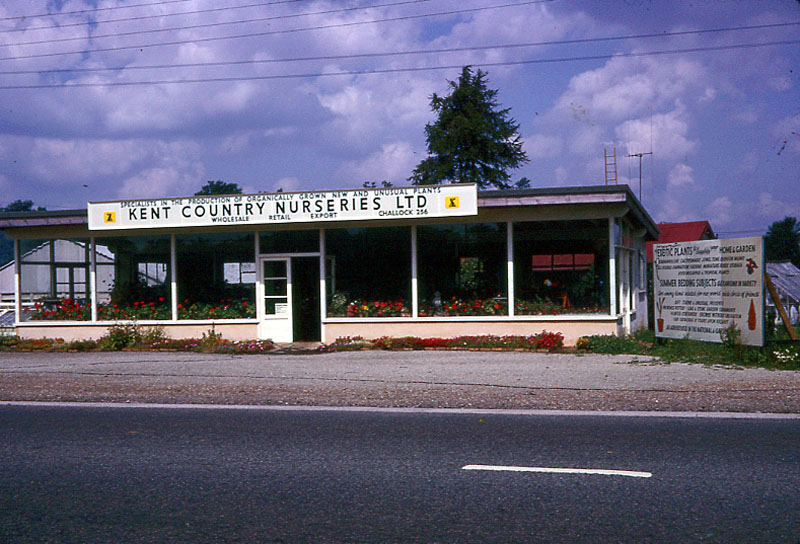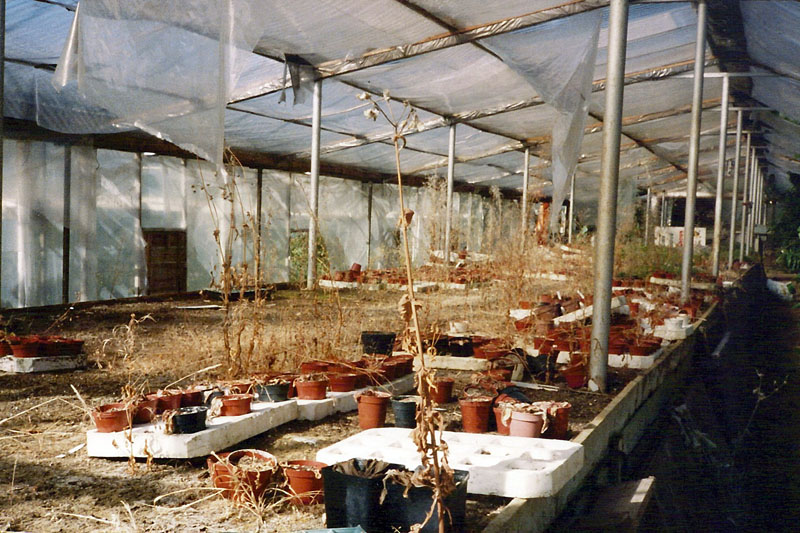1973 - 1985... Continued Expansion Until Disaster

Due to the major oil crisis that arose in 1973 along with the miner's strike, to save energy, a three day week was implemented and a government mandate enforced that all lighting was to be cut by 50%, and so for the whole of January 1973 we decided to close our main retail showrooms and install a new lighting system. We doubled the amount of lighting output by using fluorescent tubes that used less energy - yet when cut back by 50% gave the same light intensity as before; this gave the effect of natural sunshine. New display benches were made and two cash points installed for the increasing number of visitors that travelled from far a field to our nursery facing the village green known as Challock Lees.
Also in 1973 we launched a catalogue given over exclusively to seeds under the trading name 'Saracen Truth Seeds'; this not only included vegetable and flower seeds but also exotics as well as tree and shrub seeds - as we saw a trend developing, particularly for vegetable seeds.
Later during the 1970's, with a change of government to Harold Wilson's Labour party, not a week went by without a succession of strikes - postal strikes, newspaper strikes and general malaise - which for the first time slowed down our sales; inflation had reached 12%. Some will remember 1975 was a fairly dry Summer, and having purchased the current nursery site in 1973, put most of the ten acre field as it was then down to potatoes.
1976 was the year of the Great Drought when roadside verges, heath lands and fields caught fire. By the Autumn half a cabbage, if you could get one, was costing a pound, - small cauliflowers a pound each. Fresh foods including potatoes were in very short supply; it was the same across the whole of Europe. People couldn't water their gardens cutting our sales and for the first time in our history we incurred an unsecured overdraft such had been our unblemished business track record. We geared up in December 1976 to grow vegetable plants and expand our vegetable seed range. Orders in January and February of 1977 literally flooded in. We had a team of six opening the post, and our banking by mid February exceeded all previous records!
For heavy orders of shrubs and fruit trees we then used British Road Services that became known as Roadline. In March 1977 we had around 23,000 orders split between the post and Roadline according to weight. Roadline contracted with us to undercut the postal service contract; they even handled distribution of Jeremy's book - charging us 40p a copy for carriage. Up until then we had had nothing to complain of their previous service - but then crisis! Customer complaints started to pour in of non-receipt of goods. We were assured that there had been some pockets of unofficial strike disruption which was clearing; the local depot manager at Canterbury, a Mr Spencer, advised us to, 'keep dispatching' which we did. But matters didn't improve with the result complaints poured into the National Press and all our Spring advertisements were banned - the level of non-receipt complaints curtailed all publicity. Many refunds were made to customers and eventually we sued Roadline for Breach of Contract. We later learnt that many of our parcels were held at Roadline's Depot in Canterbury and that Mr Spencer was on commission for the number of packages handled. Whilst we cleared the overdraft by late Summer it was too late to sell our Spring plants!
Immediately our advertisements re-appeared trade re-started, but by the Autumn of 1978 we were back in overdraft with a change of bank manager who was most objectionable. The Autumn and Winter of 1978-79 became known as the Winter of discontent with severe frost and snow, power cuts for long periods and, eventually, Harold Wilson resigned. Harsh winters, as we have always found, are good for trade. Why? Because so many plants die and have to be replaced. Would be nurseryman and smallholders, in fact those already in business, will see that against all odds and indeed evil too you can win through. Just as we had predicted and despite this time secured with an overdraft of £60,000 Spring sales opened up well. In May 1979 Margaret Thatcher and the Tory Government were returned to office with a thundering majority. Wages went through the roof with 10-15% pay increases commonplace. An end to all strikes our business literally went mad we had never been so busy. In one week we took £51,000 (at today's value around £400,000). Customers poured into our Plant Centre; people were overjoyed the Labour Party had gone. In those days we had a chap, Tony Austen ('Bony Tony' as he was affectionately known), who looked after mail order dispatch (i.e. the packing shed) and also stretched himself to looking after our extensive show grounds. Jeremy recalls how he came to him apologising profusely, "I'm sorry Mr Shirley, I can't even get the price labels on the stock that I am brining up to the showrooms, people are just grabbing the peach trees and paying for them without asking the prices".
We thought this couldn't last, property prices were rising week by week. Later that year VAT rose to 15% and bank base rate increased to 12%. By late Spring our overdraft was paid off and we had a healthy bank balance. After having banked since 1957 with National Provincial that became National Westminster Bank and now Nat West, due to the fact that the manager had been very difficult in supporting us when we had had problems in 1978, we decided to change banks. We must say the Manager of National Westminster was somewhat surprised at out financial turn round; therefore when we said we were closing the account and moving to Lloyds he tried his utmost to make us reconsider and remain with National Westminster but our minds were made up. As it emerged that was a very bad decision, irrational maybe.
In 1980 the mad demand had come to an abrupt halt VAT at 15% high inflation and increasing unemployment as many of the Country's major industries went to the wall. Interest rates at 15% had become prohibitive for capital expenditure and investment and our level of business on terms of return on publicity fell. We did see however opportunities ahead and for want of a better expression hung on in a period of what was referred to as the recessionary years in the early 80's. Although trading was very difficult, with the introduction of new lines and imaginary advertising we continued trading profitably. At that time we introduced and were the first nursery to produce and offer biological control for white fly; we built a special unit for breeding of the Encarsia, a microscopic parasitic wasp using dwarf bean plants for them to lay their eggs on - it is much more sophisticated now. Unfortunately at that time there was great scepticism and sales were not as profitable as they should have been. During this time we changed Advertising Agents as we discovered that we had been over charged for our advertising for many years - not useful when profits were falling!
The dry Winter of 1983 was followed by a very dry Spring season with, firstly, a regional prohibition of garden watering that by late Spring / early Summer had become a government imposed national ban on garden watering. This devastated us as forward advertising costs had been incurred, Winter fuel bills paid, plant propagation in full swing to fulfil the season's sales - then by government mandate effectively a prohibition on sales as people did not buy because they could not water their gardens. Although we were up to date with all accounts we could see that with the level of orders we were receiving we thought it would be sensible to seek an additional overdraft facility to see us through the drought period. We were confident that with a change in the weather business would recover. My wife and I made an appointment at the bank to arrange a short term additional facility. The assistant bank manager was very affable and advised us that as they held an Oral Charge (this was news to us, we had never heard of this expression) he saw no problem in resolving our need.
On the following Monday morning a senior partner and two assistants from a London accountancy firm arrived at the office to explain that they had been appointed Administrators and Receiver by Lloyds Bank. The first thing that was done was all the staff were asked to gather in the canteen. The receivers made most of the staff redundant immediately. We were completely devastated and bewildered; we had asked for support from the bank and they had appointed receivers - all our representations achieved nothing. The news soon spread through the village. In November 1984 our business was advertised in the Financial Times in the most glowing terms. About ten days later a telephone call came from a lady who in so many words said I think I can get your business back from what I read.
We made sure that none of our customers suffered and every order was fulfilled. The receivers held a large auction selling all the valuable growing stock for a fraction of its worth; it was dreadful the offices and business buildings were locked and we were barred to enter, even to retrieve private papers and our valuable private collection of horticultural books. As our house was within the nursery grounds all these unpleasant happenings were going on around the family.
It was at this time that Stephen, who was in his last year at school, decided he wanted to come into the business!
 For almost fourteen months, aided by the lady that had telephoned and others that we came into on the way, we fought for our nursery and finally after many disappointments we were able to raise money to buy the nursery back from the bank. Eventually Lloyds admitted they had been negligent in handling our case.
For almost fourteen months, aided by the lady that had telephoned and others that we came into on the way, we fought for our nursery and finally after many disappointments we were able to raise money to buy the nursery back from the bank. Eventually Lloyds admitted they had been negligent in handling our case.
The buildings and glass houses were in a dreadful state, with rubbish and dead plants left by the receivers. The day after leaving school, Stephen set about the task of tidying things up - with day after day of dumping dead plants and flame gunning the knee high weeds in the greenhouses.
Despite this being a huge task for the three of us (Joan, Jeremy and Stephen), and for the then middle aged Jo and Jerry the realisation that they were effectively starting all over again, that Summer was a really happy and positive time. By October 1985 all the paperwork was completed and we were once again the official owners of the nursery. Stephen's sister, Josette, and her then fiancée, John, also joined the business; at the time their reluctance to help out or commit before the formal re-acquisition was in place did not 'ring any alarm bells', but in reality this was the first sign they were only interested in themselves and the 'easy times'!